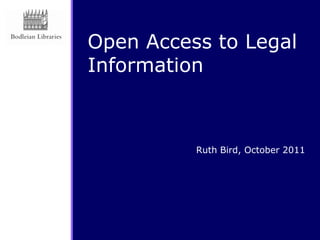
Open access to legal information
- 1. Open Access to Legal Information Ruth Bird, October 2011
- 2. What type of legal resources? Law reports of court cases Legislation created by our governments Treaties and agreements between international bodies, eg UN Journal articles
- 4. Court sites
- 5. Individual international organisations, NGOs, etc
- 6. Eisil – bringing free sites together
- 7. Free Access to Law Movement A collaborative and decentralised initiative More than 900 databases from over 130 countries Support principles of free access to law Cooperation in software development for open standards in legal information management Aims: Effectiveness of use and re-usability Sustainable models Translation in other languages & cross-language retrieval functionalities Adoption of open standards and metadata schemes for primary materials
- 8. Legal Information Institutes Different kinds of LIIs Universities and Research centres • AustLII, ITTIG, LII (Cornell), HKLII, NZLII Non-profit Trusts or Foundations or NGOs • BAILII (Trust comprises Courts, Universities, legal profession), SAFLII, Kenya Law reports (non-profit government) Legal profession, as a professional and public service • CanLII (Law Societies of Canada), Juri Burkina, CyLaw
- 9. Some Legal Information Institutes:
- 10. One example – WorldLII Single search facility for databases on 14 collaborating Legal Information Institutes, plus other databases are hosted Allows searching of 1165 databases of case law, legislation, treaties, law reform reports and law journals from over 100 jurisdictions
- 11. www.worldlii.org
- 12. DOAJ - Open Access Journals – 125 for law
- 13. Durham statement: Open access to law school journals
- 14. Free scholarly journal repository - SSRN
- 15. Oxford Legal Studies Research Paper series
- 16. BE Press Legal Repository
- 17. Free mark up software for free resources
Editor's Notes
- The primary sources for lawyers extend well beyond journal articles. Since the mid 1990s some jurisdictions have provided the material they publish free online. Legal research is not easily segmented, however, by type of material or jurisdiction, and points of law often intersect and overlap.
- Legislation: Many governments, at all levels, publish their legislation online, often going back some years as well. Issues to be aware of include whether subsequent amendments to legislation will be included in the free versions
- Law reports of court cases:There are national court systems in many countries; some of them publish the judges decisions in full text. They usually do not have any value adding such as hyperlinks to earlier cases, or key words, so are more useful for those who are looking for a specific case, rather than searching a topic of law.
- Access to treaties and other instruments of ratification with legal impact is also spread across the web, and one needs to know where to look.The problem that exists is the disparate nature of all these resources
- This is a voluntary effort by librarians to aggregate free documentary sites in one location, the shortcoming is the inability to search across the collections.
- The concept behind the LIIs is to bring the free legal resources onto one plain, searchable platform, with software that indexes all the material and then searches across acts, cases, and articles as needed to expand a point of law. The search engine is powerful but also simple, and the resource is free to use. It is the indexing software that adds value usually found in commercial databases, and this is why the LIIs are so popular and important
- This demonstrates the extent of the free access to law movement around the world
- The LIIs are a great starting point for the legal information that is produced by governments – legislatures, courts, on our behalf as citizens of a country, and they should be free and comprehensive and current, because law changes so rapidly. This is not yet always the case. And relatively few legal journals or research papers are available on them.
- There are several sources of free online legal journals, with the DOAJ the most widely known. Journals are included in the LIIs as well. Google Scholar indexes the free journals.
- There is a movement to publish university law reviews online and free, which has been agreed to by leading law sc=hools in the US under the Durham Statement. The commitment they undertake is to rely on electronic publication and the keep these electronic version in stable, open digital formats.
- Scholarly research in law has been collected in two major repositories since 1995, and the Social Science Research Network is the most widely known and used in law. It is discoverable on search engines, and papers and articles can be downloaded from the site.
- Law schools can set up their own series, for example, this is the Oxford law series, and publishers are usually comfortable with the preprints being shared in this way.
- BE Press offers a similar service, but most of the institutions participating are American. The papers are discoverable on search engines in the same way as SSRN, and again this is a free, open access site
- To make the resources searchable in a consistent way, marking up case and legislative citations consistently is important; this is an example of work being done in the field to encourage the value adding to legal resources that has often been the USP of the commercial databases. The aim is to have a system of permanent links between legal materials. These have been developed at the Italian Institute of Legal information Theory and Techniques. The entire movement to make law freely accessible online is a long cherished ideal of the legal sector everywhere, and as more governments and institutions produce core materials free online, the move to comprehensively index the materials and make them discoverable in the way legal scholars and professionals would expect is becoming more of a reality.